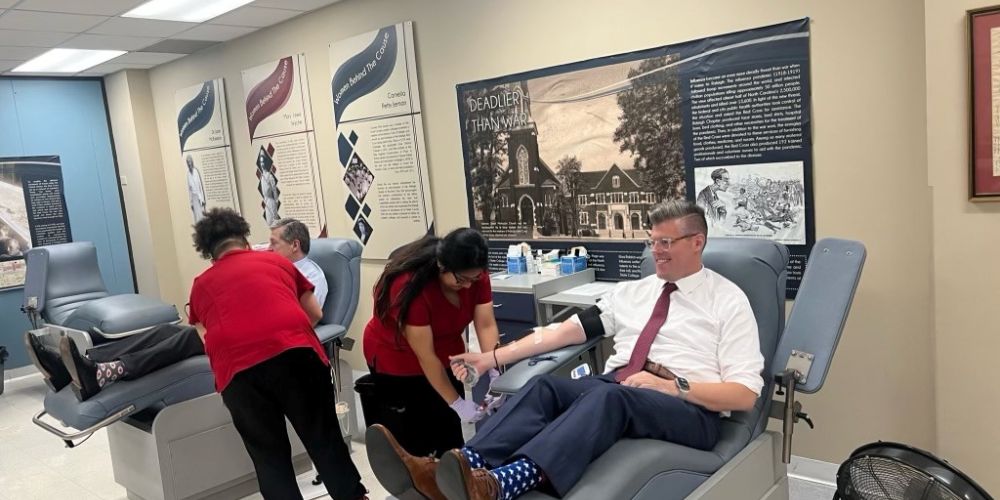|
|
|
|
|
|
 |
Increases in COVID-19 metrics have been seen in North Carolina and nationally during recent weeks, including in the early warning wastewater monitoring system. Along with wastewater, increases have been seen in other COVID-19 metrics, including hospital admissions and emergency department visits, according to data on the North Carolina Respiratory Virus Dashboard.
Influenza and respiratory syncytial virus (RSV) are two other seasonal viruses that cause respiratory infections and can also cause severe illness or even death, particularly in older adults, young children and those with underlying medical issues. Flu and RSV infections typically peak between December and February, but the timing has been less predictable since the start of the COVID-19 pandemic.
State health officials encourage all North Carolinians to prepare for the fall respiratory virus season by staying up-to-date with COVID-19 vaccines, getting a seasonal flu vaccine and talking to your doctor about getting an RSV vaccine if you're over 60. The updated COVID-19 booster is expected to be available by the end of September.
As we move into the Fall season, have a supply of tests available and seek treatment if you test positive. Visit the Testing & Treatment page for information on how to get free at-home COVID-19 tests and how to access treatment. Read a news release for more actions you can take to stay healthy. |
|
 |
On Monday, Aug. 7, the American Red Cross began accepting blood donations from newly eligible individuals, many in the LGBTQ+ community, under the U.S. Food and Drug Administration's expanded eligibility recommendations.
NCDHHS Secretary Kody Kinsley and NCDHHS State Health Director and Chief Medical Officer, Dr. Elizabeth Cuervo Tilson, along with Gov. Cooper, donated blood on Aug. 7 at the Raleigh Red Cross.
Secretary Kinsley and Dr. Tilson led an effort, joined by nine other states and the District of Columbia, calling on the FDA to update this policy. Secretary Kinsley and Dr. Tilson encourage all North Carolinians, including those newly eligible to donate, to be regular blood donors.
Adopting these new recommendations is the best way to ensure there is a safe and robust supply of blood. NCDHHS partnered with EqualityNC, Harmony and the LGBT Center of Raleigh on the event and invited those in Raleigh and surrounding areas to give blood alongside them. Read more and see pictures from the event. |
|
|
|
 |
NCDHHS to Hold Community Meetings on Fish Consumption Due to PFAS
NCDHHS is recommending limits on the consumption of freshwater fish from the lower Cape Fear River based on concerns about exposure to per- and polyfluoroalkyl substances (PFAS), which are often called “forever chemicals” because they don’t break down in the environment. The recommendations are based on newly available data and new information from the U.S. Environmental Protection Agency. Fish advisories are issued to help people weigh for themselves the value of eating fish with the risks of pollutants fish absorb from their environment. The department is hosting in-person community meetings to provide additional information and answer questions. The first meeting will be on Aug. 17 from 6 to 8 p.m. at Bladen Community College Auditorium, 7418 NC HWY 41W in Dublin. The second meeting will be on Aug. 22 from 6 to 8 p.m. at Navassa Community Center, 338 Main St. in Navassa. A virtual meeting will be held on Aug. 24 at 6 p.m. and registration is required.
|
|
 |
2024 WIC State Plan Available for Comment
NCDHHS' Special Supplemental Nutrition Program for Women, Infants and Children (WIC) is accepting comments on its WIC State Plan for Fiscal Year 2024 (Oct. 1, 2023 - Sept. 30, 2024) through Aug. 15. The state plan is produced annually and is a comprehensive look at a vital state program. In the federal Fiscal Year 2023, there were more than 260,000 women, infants and children enrolled in North Carolina’s WIC program and the budget was more than $191 million. The WIC State Plan breaks down the budget by county and department. The vendor manual is a part of the plan, which includes the regulations required for the stores and shops that accept eWIC payment cards. The plan identifies eight critical goals, which include ensuring that state and local staff deliver effective nutrition services that improve the health status of all participants; increasing the number of women who initiate breastfeeding; and reducing the potential for vendor fraud and abuse. To comment on the 2024 State WIC Plan by Aug. 15, email Maryanne Burghardt at maryanne.burghardt@dhhs.nc.gov. The plan will automatically download to your computer as a zip file. You can also submit written comments to: NCDHHS, Attn: WIC State Plan, 1914 Mail Service Center, Raleigh, NC 27699-1914, or by FAX: 919-870-4898. Please include ATTN: WIC State Plan in the subject line. |
|
|
|
 |
NC Receives Eight Breastfeeding Awards of Excellence
Eight of North Carolina’s WIC and Public Health offices earned Breastfeeding Awards of Excellence from the USDA Food and Nutrition Service this year. Six won the Gold Award, and both of the Premiere Awards given this year were claimed by WIC offices in North Carolina. Breastfeeding Awards of Excellence are earned based on a variety of performance measurements of breastfeeding, which include the effectiveness of the office’s peer counselor program, and the extent to which the agency has partnered with other entities to build a supportive breastfeeding environment for women participating in WIC. The exemplary awards are given at three levels of performance that build on one another – Gold, Premiere and Elite. Gold awards were received by the Appalachian District Health Department, Catawba County, Granville-Vance Public Health, Haywood County, Iredell County and Piedmont Health Services. Buncombe and Pender counties both won Premiere Awards. Read more in an NCDHHS newsletter article. |
|
 |
NCDHHS' Hospital-Based Epidemiologist Program Celebrates 20th Anniversary
NCDHHS' Hospital-Based Public Health Epidemiologist (PHE) Program is celebrating its 20th anniversary this year. NCDHHS' Division of Public Health (NC DPH) developed the program in 2003 to increase the surveillance of significant events in public health by placing public health epidemiologists in the state's largest hospital systems. The partnerships between NC DPH and the state's hospitals have had a profound effect on communicable disease surveillance and have enhanced the protection of North Carolinians. PHEs have often provided our first indication of public health issues and outbreaks. They have been a critical part of NCDHHS' routine work and throughout many emergency responses. Data from the PHE network has been critical for helping the department track COVID since the beginning of the pandemic and the PHEs have played many other roles in that response. To fulfill its mission, the PHE program is composed of 13 individuals – the program director and 12 PHEs at eight locations. Considerations made in selecting hospitals include bed size, emergency department volume, and characteristics of the population served. Read more about the history of the program in an NCDHHS newsletter article. |
|
|
|
|
|
|
|
|

